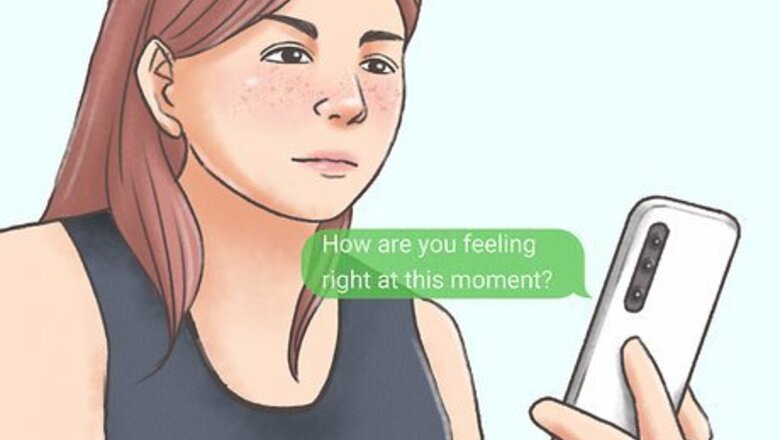
views
“How are you really doing?”
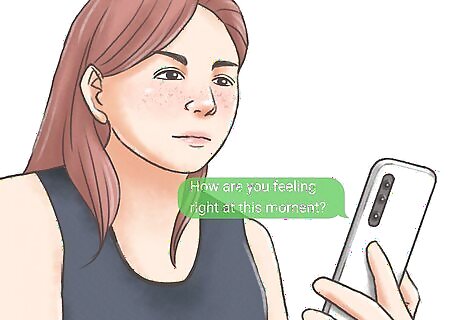
Your friend might be afraid to be vulnerable while they’re hurt. That’s why they might just say “I’m fine” when you ask “How are you?” Allude that you want to know more by asking something like “How are you doing emotionally?” It’s not something people say often, but it makes it clear that you care about their feelings. Try asking: “How are you feeling right at this moment?” “How are you holding up today compared to yesterday?” “If I were your diary, how would you tell me you were feeling?”
“I’m here for you.”
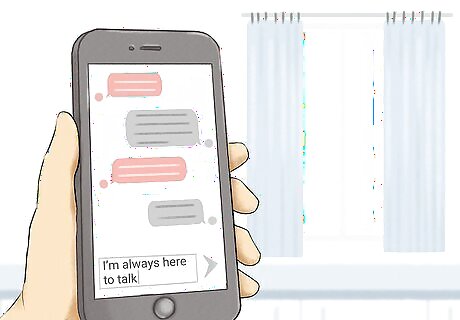
It sounds cliché, but a friend in heartbreak just needs to know you’ve got them. Sometimes it’s the only comforting thing you can say, especially when the breakup is still raw. Let them know you’ll be there to support them however they need, whenever they need it. Send them comforting messages like: “Text me or call me whenever you want. I’m always here to talk ❤️” “You know I’m down to take you out or just be a shoulder to cry on. Let me know what you need!” “I want to support you however I can. You can always come to me to vent, cry, yell, go dancing, whatever you need to do.”
“You have every right to feel that way.”
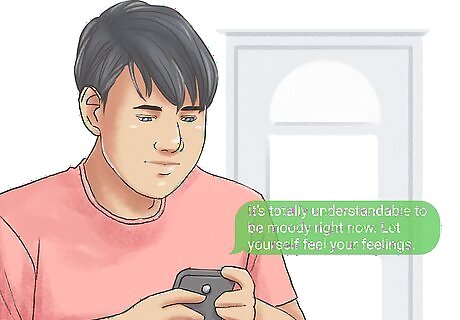
Everyone grieves the end of a relationship in their own way. Tell your friend it’s totally OK to feel sad one second and angry the next—it’s all valid. If they’re acting out of character (like being impulsive or going out way more often), tell them their actions don’t define them as a person and to show themselves compassion. Text things like: “It’s totally understandable to be moody right now. Let yourself feel your feelings.” “Whatever you feel right now is right, whether you feel mad or sad or confused.” “Don’t worry about acting out right now. People react to breakups in a lot of different ways.”
“Take your time to feel better.”
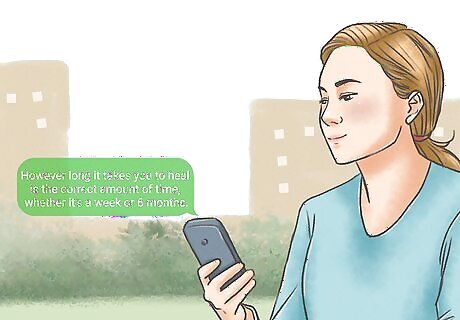
There’s no correct amount of time it takes to get over a breakup. Many people try to act like they’re over it quickly or feel guilty for taking a long time to recover. Tell your friend no one’s expecting them to get over it in a week and to give themselves space to heal their own way. Send supportive messages like: “You’re bound to have good days and bad days. Take all the time you need to feel better!” “However long it takes you to heal is the correct amount of time, whether it’s a week or 6 months.” “Go at your own pace. Just because it seems like some people get over breakups quickly doesn’t mean you have to!”
“You’re a strong, wonderful person.”
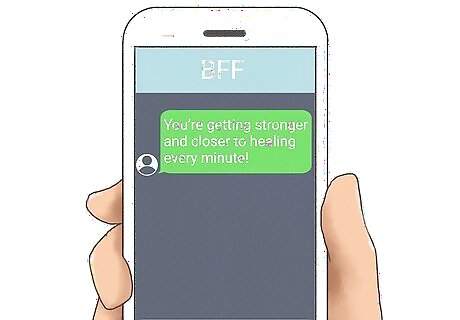
Your friend’s probably feeling low whether they initiated the split or not. It’s common to second guess their decision or feel pessimistic about their love life. Build them up and tell them how strong and resilient they are. Encourage them to see it in themselves too. Text them compliments like: “You’re getting stronger and closer to healing every minute!” “I’m proud of you for having a really tough conversation and handling it with so much compassion.” “Look yourself in the mirror today and build yourself up the way you would do it for me!”
“It isn’t anybody’s fault.”
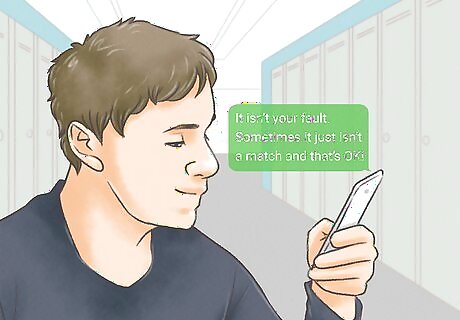
If your friend was broken up with, they might feel guilt or blame. It’s easy for the partner who was dumped to feel inadequate or like the separation was their fault. Reassure them that breakups happen and no one is to blame—sometimes it’s just not a match, and it’ll be easier to move on when they let go of their guilt. Text them: “It isn’t your fault. Sometimes it just isn’t a match and that’s OK!” “You didn’t do anything wrong! If it wasn’t meant to be, it’s best that it ended sooner than later.” “Don’t blame yourself. You are more than enough to be a great partner. Not all relationships last forever and you don’t have to feel guilty about this one not working out.”
“I’m thinking about you.”
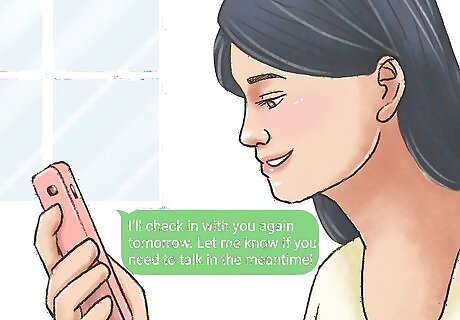
Your friend still needs love and support even after they seem “over it." Keep checking in with them to see how they’re doing to show you care about them in the long-term. If your friend’s feeling lonely, your reliable presence will be a comfort to them (even if it’s over text). Text things like: “I’ll check in with you again tomorrow. Let me know if you need to talk in the meantime!” “Hey friend ???? just letting you know I’m still thinking about you.” ”Good night!” (send a nightly “good night” text to create a comforting routine).
“What can I do to help?”
A breakup can impact your friend’s ability to keep up with their to-do list. They might struggle to clean their apartment, run errands, or cook for themselves. If you live nearby, offer to assist them with the little things. It shows them you’re willing to physically help them out and that you care about how they’re doing. Text them to ask what you can do or suggest specific things like: “Hey I’m headed to the grocery store, is there anything I can pick up for you?” “What can I do to help you out? I’m happy to take a few errands off your plate if you need it!” “I’m making an extra big batch of lasagna tonight. I’ll bring you some for dinner!”
“Do you want some space?”
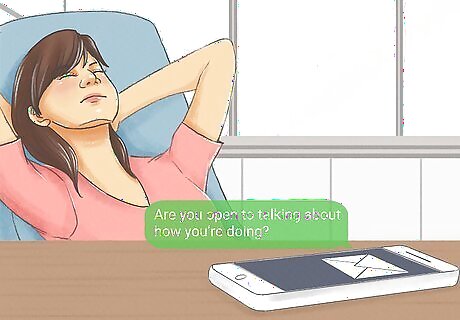
Everyone opens up about their post-breakup feelings at different times. Some people are ready to talk right away while others might need a few days or weeks to process it first. Ask your friend openly if they’re ready to talk or if they need more time. Text questions like: “Are you open to talking about how you’re doing?” “Do you need some time to process what you’re going through on your own?” “Would it be helpful for you to talk right now? Or would it be helpful for you to just have some space?”
“Go get some fresh air.”
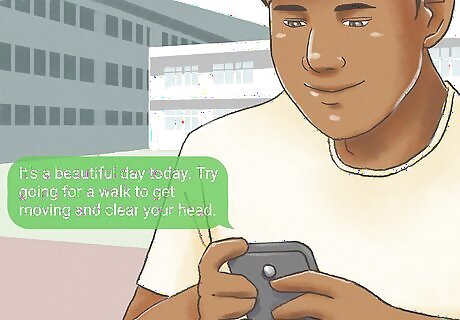
When your friend focuses on their health, they’ll feel better about themselves. It’s OK if they want to crawl in bed and eat ice cream for a day, but don’t let them stay there. Prompt them to cook a healthy meal or get some exercise. They’ll feel healthier and more like they can tackle each day. Try: “It’s a beautiful day today. Try going for a walk to get moving and clear your head.” “Why don’t I come over and we can make a nice home-cooked dinner together?” “Here’s your friendly reminder to get out of bed and have a great day!”
“Don’t check your social media today.”
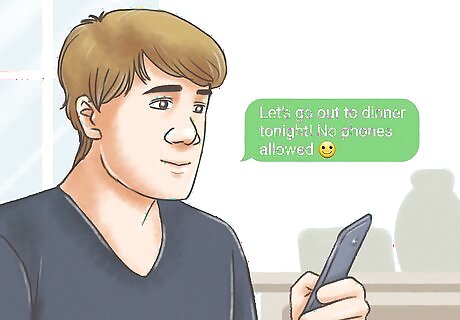
Your friend might need some help to stop fixating on their fresh ex. Texting or calling their ex or scrolling through their social media profiles can drag out the pain and grief your friend feels. Invite them to do phoneless activities with you or encourage them to disconnect for a while. Try things like: “Let’s go out to dinner tonight! No phones allowed ????” “Let’s take a social media break together. I won’t check mine for 3 days if you don’t.” “Have you thought about blocking or deleting their number? I bet you’d feel better if the temptation to text them is gone.”
“Let’s hang out.”
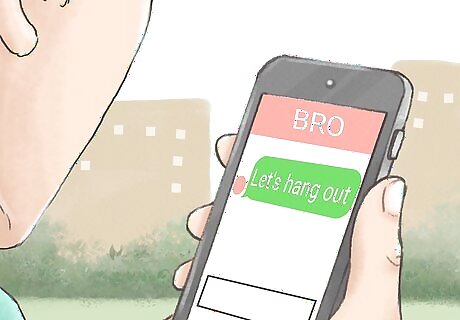
Keeping your friend busy will distract them from the breakup temporarily. For someone in heartache, spending time with friends can reconnect them to who they are and uplift them during their healing process. Plan an activity they're up for—it could be a night out on the town or a pizza night at home. If you’re far away, try a virtual movie night or dinner via Zoom. “Let’s get together this weekend to cheer you up. What do you feel like doing? We could check out that new pop up bar you mentioned last week!” “I’d love to see you soon. Why don’t I come over and we can just hang out?” “Whatever you want to do today, just tell me what it is and we’ll do it!”
“I’m here to listen.”
Your friend needs to vent without judgment to someone they trust. Be there to listen without offering suggestions or advice (unless they ask for it) and let them share what they’re comfortable sharing. When your friend feels safe to open up, they’ll feel heard and loved throughout the aftermath of their breakup. Tell them: “I’m all ears if you ever need to vent or get something off your chest.” “Treat my number like a judgment-free hotline, I’m here to listen 24/7.” “You don’t have to censor yourself around me, you can say whatever you need to say to feel better. I got you!”




















Comments
0 comment